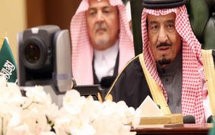 In response to the U.S.-Iranian rapprochement, Saudi Arabia is working on transforming the Gulf Cooperation Council into a much more robust supranational entity in order to counter the threat from Iran. However, Riyadh faces limits in the extent to which it can transform the Gulf Cooperation Council into a more coherent alliance. Most of the smaller member states agree with the Saudis on the need for a joint defense against an Iran that is likely to be unencumbered by international sanctions, but they do not want to align with the kingdom at the expense of their own national sovereignty.
In response to the U.S.-Iranian rapprochement, Saudi Arabia is working on transforming the Gulf Cooperation Council into a much more robust supranational entity in order to counter the threat from Iran. However, Riyadh faces limits in the extent to which it can transform the Gulf Cooperation Council into a more coherent alliance. Most of the smaller member states agree with the Saudis on the need for a joint defense against an Iran that is likely to be unencumbered by international sanctions, but they do not want to align with the kingdom at the expense of their own national sovereignty.
After a Gulf Cooperation Council summit -- the first since the United States moved to normalize ties with Iran -- in Kuwait that began Dec. 9, the bloc's Supreme Council announced that the member states had agreed to establish a joint military command and police force. This announcement comes after Saudi efforts to convert the alliance into a confederation met with resistance. Oman's foreign minister, in an unusually blunt statement, rejected the idea, saying that Muscat would withdraw from the Gulf Cooperation Council if it formed such a political union.
Oman's strong public stance against the idea proposed by Saudi King Abdullah two years ago is in keeping with its distinct character as a non-Sunni Arabian Peninsula polity that has existed in one form or another for centuries at the crossroads of Persian, African and Indian civilizations. Muscat's opposition to the idea was thus expected, but other members of the council are uncomfortable with the idea as well.
To varying degrees, the United Arab Emirates, Qatar, Bahrain and Kuwait also fear that Saudi Arabia would dominate any such entity, given the kingdom's geopolitical heft relative to theirs. This is why the bloc's assistant secretary-general described the unification project as a long-term one in a Dec. 9 statement. However, opposition to the idea of a political union does not mean that these countries do not share Riyadh's sense of urgency for collective action to counter the threat posed by Tehran. Since the 2003 regime change in Iraq, Iran has been on the rise and is now poised to become even more of a regional power since it has begun the process of international rehabilitation.
This explains why the member states agreed on the formation of a joint military force even though they oppose the idea of a political union. In fact, in many ways the Gulf Cooperation Council states demonstrated joint military action when they dispatched the Peninsula Shield Force to Bahrain in March 2011 to quell the largely Shia-led uprising in the island nation. Thus, the council's Dec. 10 announcement is to create a more formal standing military force as opposed to an ad hoc task force that handles internal threats in one or more member states.
Even in the case of threats emerging from within the Gulf Cooperation Council, the bloc is moving toward a supranational police force. But in order for the member states to try to defend themselves against Iran, a much larger military power, the formation of a joint defense command is essential. The fear is that the U.S. security umbrella is no longer reliable now that Washington is moving toward a detente with Tehran, and that the United States wants to use a rehabilitated Iran as leverage to create a sectarian balance of power in the region.
The driving force behind the Gulf Cooperation Council's evolution into something more than the loose alliance it has been since its formation in 1981 is, of course, Saudi Arabia. Riyadh knows that the desire to form a political union is idealistic, since its Gulf allies are not all in agreement on how to manage the Iranian threat. Kuwait, given its own sizable Shiite minority and location close to Iraq, is seeking to develop a close working relationship with Baghdad as one means of keeping the Shia at bay.
Qatar has backed away from competing with Saudi Arabia since the installation of the new Qatari emir, but it has its own relationship with Iran. Likewise, the United Arab Emirates -- particularly Dubai -- have close ties with Tehran. That leaves Bahrain, which has become increasingly dependent on Saudi Arabia because of the challenges posed by the small country's Shiite-majority population and lack of energy wealth.
This means that a Saudi-Bahraini confederation is more feasible than a Gulf Cooperation Council-wide political union. However, such a bilateral arrangement would conflict with the creation of a joint Gulf Cooperation Council military command, so it is not clear how it could be established. Thus, Saudi Arabia has to deal with disagreements among the Gulf Cooperation Council member countries in order to be able to leverage the bloc against an Iran that is on the cusp of becoming a much bigger regional player than it already is.
Courtesy : Stratfor (www.stratfor.com)